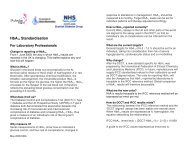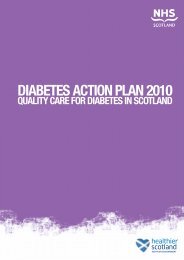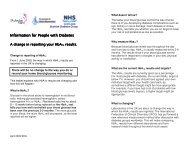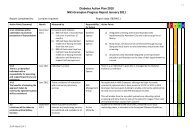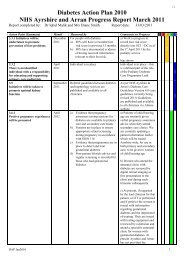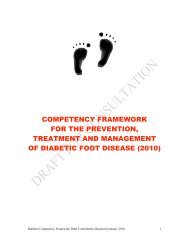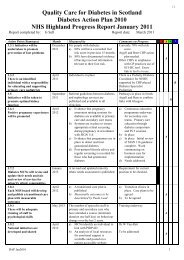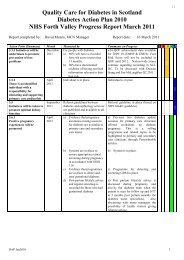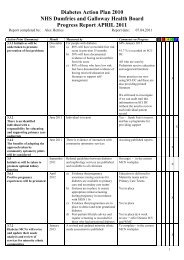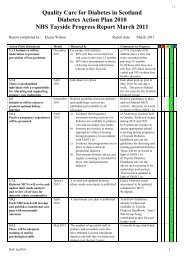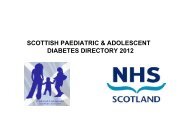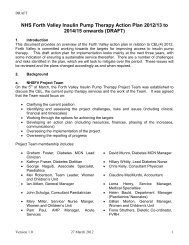Information for People with Diabetes A change in reporting your HbA1c results
Print version - Diabetes in Scotland
Print version - Diabetes in Scotland
- No tags were found...
Create successful ePaper yourself
Turn your PDF publications into a flip-book with our unique Google optimized e-Paper software.
cont<strong>in</strong>ue until 31 May 2011. So <strong>for</strong> example, the report of<br />
<strong>your</strong> HbA 1c result might read:<br />
HbA 1c (DCCT) 6.9%<br />
HbA 1c (IFCC) 51 mmol/mol<br />
The fact that the number is higher does not<br />
mean there is more glucose <strong>in</strong> <strong>your</strong> blood. It is<br />
just a different way of express<strong>in</strong>g the same<br />
th<strong>in</strong>g.<br />
Scottish <strong>Diabetes</strong> Group<br />
<strong>In<strong>for</strong>mation</strong> <strong>for</strong> <strong>People</strong> <strong>with</strong> <strong>Diabetes</strong><br />
A <strong>change</strong> <strong>in</strong> report<strong>in</strong>g <strong>your</strong> <strong>HbA1c</strong><br />
<strong>results</strong>.<br />
Change to report<strong>in</strong>g of HbA 1c<br />
When is the <strong>change</strong>over to only IFCC units?<br />
From 1 June 2011, <strong>results</strong> will be given only as the HbA 1c<br />
(IFCC) <strong>in</strong> mmol/mol.<br />
From 1 June 2009, the way <strong>in</strong> which HbA 1c <strong>results</strong> are<br />
reported <strong>in</strong> the UK is chang<strong>in</strong>g.<br />
There will be no <strong>change</strong> to the way you do or<br />
record <strong>your</strong> home blood glucose monitor<strong>in</strong>g.<br />
This leaflet expla<strong>in</strong>s why <strong>HbA1c</strong> <strong>results</strong> are chang<strong>in</strong>g and<br />
how this will happen.<br />
What is HbA 1c ?<br />
If you have any questions or concerns about this please<br />
contact <strong>your</strong> diabetes specialist nurse, practice nurse, GP<br />
or the <strong>Diabetes</strong> UK Carel<strong>in</strong>e 0845 120 2960 or visit<br />
www.diabetes.org.uk<br />
Glucose <strong>in</strong> the blood sticks to haemoglob<strong>in</strong> <strong>in</strong> red blood<br />
cells, mak<strong>in</strong>g glycosolated haemoglob<strong>in</strong>, called<br />
haemoglob<strong>in</strong> A1c or HbA 1c . Red blood cells live <strong>for</strong> about<br />
8 – 12 weeks be<strong>for</strong>e be<strong>in</strong>g replaced so the HbA 1c test<br />
tells you how well controlled <strong>your</strong> blood glucose has<br />
been over the previous 2-3 months. The more glucose<br />
<strong>in</strong> <strong>your</strong> blood, the more HbA 1c will be present, so the level<br />
reported will be higher.<br />
April 2009 SDG
What does it tell us?<br />
The better <strong>your</strong> blood glucose control the less chance<br />
there is of you develop<strong>in</strong>g diabetes complications such as<br />
eye, kidney or nerve damage, heart disease or stroke.<br />
The HbA 1c test tells you whether you are on target to keep<br />
<strong>your</strong> risk of complications as low as possible.<br />
Why measure Hba 1C ?<br />
Because blood glucose levels vary throughout the day<br />
and from day to day, HbA 1c is usually measured every 3-6<br />
months. The <strong>results</strong> show if <strong>your</strong> blood glucose control<br />
has altered <strong>in</strong> response to <strong>change</strong>s <strong>in</strong> <strong>your</strong> diet, physical<br />
activity or medication.<br />
What are the current HbA 1C <strong>results</strong> and targets?<br />
The HbA 1c <strong>results</strong> are currently given as a percentage.<br />
For most people <strong>with</strong> diabetes, the current HbA 1c target is<br />
below 7%. However, you should have agreed <strong>your</strong> own<br />
<strong>in</strong>dividual target <strong>with</strong> <strong>your</strong> health care team, as<br />
sometimes a different target might be more appropriate.<br />
For example, if you have had a lot of problems <strong>with</strong> low<br />
blood glucose levels (hypos), a higher target might be<br />
appropriate.<br />
What is chang<strong>in</strong>g?<br />
Laboratories <strong>in</strong> the UK are about to <strong>change</strong> the way <strong>in</strong><br />
which the HbA 1c <strong>results</strong> are reported. The International<br />
Federation of Cl<strong>in</strong>ical Chemistry (IFCC) has put <strong>for</strong>ward a<br />
new reference measurement method after discussion <strong>with</strong><br />
diabetes groups worldwide. This will make compar<strong>in</strong>g<br />
HbA 1c <strong>results</strong> from different laboratories and from<br />
research trials throughout the world much easier.<br />
What are the IFCC HbA 1c <strong>results</strong>?<br />
The way the <strong>results</strong> will be given is very different from<br />
what is known as the DCCT aligned <strong>results</strong>, but the test<br />
will still give you the same basic <strong>in</strong><strong>for</strong>mation about what<br />
<strong>your</strong> glucose control has been over the last 2-3 months.<br />
The measurement will be <strong>in</strong> millimoles per mol<br />
(mmol/mol) <strong>in</strong>stead of percentage (%)<br />
Here is how the <strong>results</strong> compare:<br />
HbA 1c (DCCT) HbA 1c (IFCC)<br />
(%) (mmol/mol)<br />
6.0 42<br />
6.5 48<br />
7.0 53<br />
7.5 59<br />
8.0 64<br />
9.0 75<br />
10.0 86<br />
11.0 97<br />
12.0 108<br />
How will the targets <strong>change</strong>?<br />
The equivalent of an HbA 1c target of 7 % is an<br />
HbA 1c (IFCC) target of 53 mmol/mol. (See the table<br />
above).<br />
When will this happen?<br />
The IFCC units <strong>for</strong> HbA 1c are obviously very different from<br />
those currently <strong>in</strong> use. Everyone will need time to become<br />
familiar <strong>with</strong> these units, and how they compare <strong>with</strong> the<br />
current result. So from 1 June 2009, all <strong>HbA1c</strong> <strong>results</strong> <strong>in</strong><br />
the UK will be given <strong>in</strong> both units: <strong>HbA1c</strong> (DCCT) %, and<br />
<strong>HbA1c</strong> (IFCC) mmol/mol. This dual report<strong>in</strong>g will<br />
April 2009 SDG



